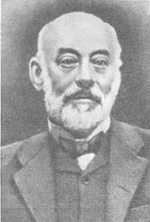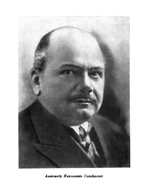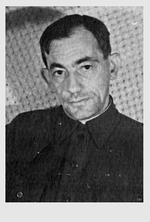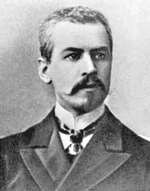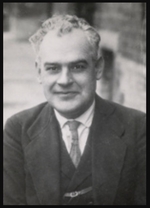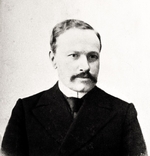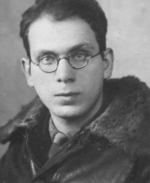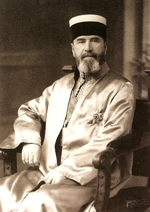Articles
Saleman Karl (Karl Gustav Hermann) (1849–1916)
Saleman Karl (Karl Gustav Hermann) (1849–1916) – orientalist, Iranist.
In 1871, he graduated from the Faculty of Oriental Languages of the St. Petersburg University, at the Arabic-Persian-Turkish-Tartar and Sanskrit-Persian Departments. In 1875, she worked at the University as an ass. Librarian; since January 1876, she taught – a course in Avesta, for instance. In 1876-1886, and 1889-1916, she was Ass. Docent of the Chair of Persian Literature. In 1886-1889 – Ass. Docent of the Chair of Sanskrit Literature
At the same time she served at the Library of the Ac. of Sc. In 1890-1916, she was Head of the Asian Museum at the Ac. of Sc. (later the Leningrad Branch of the Institute of Oriental Studies/ Institute of Oriental Manuscripts).
Read More
Samoilovich Aleksander (1880–1938)
Samoilovich Aleksander (1880–1938) – specialist in Turkology and Islamic studies.
In 1903, he graduated from the Faculty of Oriental Languages of the St. Petersburg University. He started his research work under the supervision of P. M. Melioransky, V. V. Bartold, V. D. Smirnov, V. A. Zhukovsky, and V. V. Rosen. After the graduation he stayed at the University; in 1906, after the death of P. M. Melioransky, he started to teach Turkic courses as Ass. Docent. Since September 1917, he was Docent; since December – Professor. In 1925, he was elected for Correspondent Member of the Ac. of Sc. of the U.S.
Read More
Sarabianov Vladimir (1886–1952)
Sarabianov Vladimir (1886–1952) – Soviet philosopher, historian and economist, author of anti-religious articles.
He participated in the revolutionary movement since 1903; in 1911, he graduated from the Legal Faculty of the Moscow University – at the Economical and Civic Departments. In 1922-1930, he worked for the ‘Pravda’ Magazine. Since 1930, he taught at various institutions.
He was an active participant of philosophical discussions of 1920-s – 1930-s, where he was criticized as ‘Mechanist’.
Read More
Schilling Eugeny (1892–1953)
Schilling Eugeny (1892–1953) – specialist in the Caucasus studies, historian and ethnographer.
He graduated from the Historical and Philological Faculty of the Moscow State University; since 1920, he worked at the Committee for Studying Languages and Ethnic Culture of the peoples of the Caucasus; later – at the Sector of the Caucasus of the Institute of Ethnography. He was one of the founders of the Central Museum of Ethnography in Moscow (1923-1948); in 1939-1952, he taught at the Chair of Ethnography of the Historical Faculty of the Moscow State University; he was participant and organizer of more than 20 ethnographical expeditions to the Caucasus.
Read More
Schmidt Aleksander (1871–1939)
Schmidt Aleksander (1871–1939) – specialist in Arabic studies, especially – Arabic language and literature, Islam and Moslem law; disciple of V. R. Rosen.
He graduated from the Faculty of Oriental Languages of the St. Petersburg University in 1894. In 1896, after the Master exams, he was sent for the training in Europe, where he studied at such famous scholars as Hungarian Orientalist, Arabist and specialist in Islam Ignác Goldziher, Austrian-Hungarian Orientalist Joseph von Karabacek, and Dutch Arabist, Professor of the Leiden University Michael Jan de Goeje. Later he stayed at the St. Petersburg University; there he has taught Arabic language and Islamic studies for twenty years.
Read More
Semenov Daniel (1890–1943)
Semenov Daniel (1890–1943) – specialist in Arabic and Islamic studies.
In 1908, finishing the Kerch gymnasium, he enrolled to the Faculty of Oriental Languages of the St. Petersburg University; he studied there under the supervision of N. A. Mednikov, A. E. Schmidt, and I. Yu. Krachkovsky. During his educational period, he twice was sent to Beirut (1910 and 1911).
After the graduation, he was invited to a position at the Teachers-Training Seminary of the Orthodox Palestinian Society in Nazareth. Having returned to Russia, he worked at the Economical Department of the Soviet of People’s Economics, later – at the Petrograd Trade Custom Office. Since September 1922, he was Teacher, Docent of the Chair of Arabic Language and Literature at the Institute of living Oriental Languages; he also taught at the Leningrad Institute of Philosophy, Literature and History.
Read More
Seroszevsky Waclaw (1858–1945)
Seroszevsky Waclaw (1858–1945) – ussian and Polish ethnographer, writer, Polish insurgent.
He was born in Poland, in a gentry family with a modest income; soon the property was confiscated after the suppression of the Polish rebellion of 1863 by Russian authorities. After the gymnasium, he studied at the professional school and got a qualification of Mechanic.
In 1870-s, he participated in the workers’ movement, was arrested and sentenced to imprisonment, but instead he was sent to hard labour camp in Siberia for 12 years (1880-1892). Twice he tried to escape, but failed.
Read More
Shakhmatov Aleksey (1864–1920)
Shakhmatov Aleksey (1864–1920) – philologist and historian.
In 1883, he enrolled to the Historical and Philological Faculty of the Moscow University, where he studied under the supervision of F. F. Fortunatov.
In 1887, he got the Candidate degree for his graduating paper ‘On the length and Accent in the Common Slavic Language’; he stayed at the University to prepare himself for the Professor position at the Chair of Russian Language and Literature. In 1890, he passed his Master exams and started to teach the history of Russian language at the Moscow University.
Read More
Shakhnovich Mikhail (1911–1992)
Shakhnovich Mikhail (1911–1992) – historian of social thought and religion, folklorist.
He was born in St. Petersburg, graduated from the Leningrad Institute of Philosophy, Literature and History (1932). He was a disciple of V. Ya. Propp, M. C. Azadovsky, I. G. Frank-Kamenetsky, N. M. Matorin. He was one of the founders of the Museum of the History of Religion of the Ac. of Sc. of the U.S.S.R. (1932), Senior Researcher (1932-1941), Deputy Director on Research (1944-1960) of that Museum.
Read More
Shapshal Seraya (Sergey Markovich) (Hadji Seraya Khan Shapshal) (1873–1961)
Shapshal Seraya (Sergey Markovich) (Hadji Seraya Khan Shapshal) (1873–1961) – philologist, hakham (gaham; head of the Karaites religious community).
In 1894, after a gymnasium in St. Petersburg, he enrolled to the St. Petersburg University, at the Faculty of Oriental Languages. In 1899, after the graduation, he stayed at the University for further studies.
In 1901-1908, on the recommendation of the Ministry of Foreign Affairs, he was sent to Iran, where he taught the Crown Prince (waliahd) Mohammad Ali Qajar Russian language (in 1909, Mohammad Ali became Persian Shakh, but for a short period).
Read More
Showing 261-270 of 351 items.

